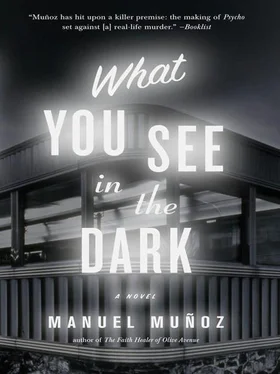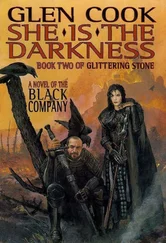Or this: A few days later, on a Monday, as you stepped out of the shop’s back room into the dusty alley out back, a little jar sitting on top of the garbage can. At first you thought it was from your clean-cut boyfriend, the jar sealed tight, with its label removed, and but inside lay a card from the Mexican bingo game, tilted to the side. A picture of a rose. Such specificity! Such imagination! la rosa and the number 41. Not your language. Colors in the faded scheme of the Mexican restaurant on the corner, that dusty blue, that exhausted pink. The gift was for that girl, but you crammed the jar into your purse as you scanned the empty alley. Around the corner, you tossed it into one of the city’s corner trash bins.
You don’t tell the ladies about that. What would this fact mean? What is the fact? That there was a jar? Or that the girl never received it?
Another jar appeared, its Gerber baby-food label missing and inside a store of shelled walnuts. The only reason you didn’t take it was the dark shape of a head ducking around the building at the end of the alley, studying, watching, guarding. Off you went, as you always would, rounding the corner, and just a ways down stood a short Mexican man in a white T-shirt, everything about his slender body tight and worked, as if he’d gathered those walnuts himself, up in Pixley in the center of the Valley, where the harvest had been going on, and when you passed him — this Mexican man who had no business just standing on a street corner like that — you understood that something had gone on between him and that girl, something Dan Watson didn’t know about, something that girl had held close to her when she measured the sultriness of her singing.
These are facts. Everyone in town has facts. They bring them out into the open to give them sense, even when there is none to be made. But you saw it. You put it all together.
That night, the girl held a hand at her throat, as if the thick cotton of a cold was catching. She had begged off singing. The crowd had been disappointed when Dan Watson made the announcement, but they lured her onstage with determined applause. She sang a Patsy Cline number very poorly, and even though she was showered with polite clapping, she made a funny grimace and gestured at her throat. The crowd allowed her offstage without much protest, and Dan Watson had to sing alone. She had stepped back behind the bar to watch him. Everyone watched him. You watched him. The hard stare of that man hiding in the shadows watched him. Dan Watson took command of the stage in his dark jeans and boots, a white cowboy hat still on. His body stood still — hips, upper body, even his knees refusing to quiver with nerves — and he announced that he would be doing an old Carl Smith song, “Hey Joe!” He held the guitar firmly and then began, all eyes on the quick dancing of his right hand, the song jumpy and energetic, a song about making his attentions clear to steal a friend’s girl.
She had watched him, his stiff, hard body, the white hat casting a shadow over his eyes, over half of his face, so that all the women in the audience could look only at his hard mouth.
That girl had been jealous, knowing those women had looked at Dan like that.
You had looked at Dan Watson like that.
That nameless Mexican face along the back wall must have seethed at how the women looked at Dan, the ripple of need he set off in them, sitting next to their clean-cut men.
All that need. Husbands fail. Boyfriends cannot provide. Men in the cantina feeling they could never match up against someone like Dan Watson, the collapsing darkness of the place allowing them to hide that fear. Whoever that Mexican face belonged to, nothing he could ever do would match whatever Dan Watson offered her.
Not a week later came the night in question.
That girl looking up at the painted ceiling of the Fox Theater, up at every tiny light shining down on her, the ceiling painted dark and swirled with faint clouds, studded with tiny lights that beamed down like stars. She looked up at the painted sky as if Dan Watson had offered it to her himself, as if he were the one who opened the barely contained promise of the Fox Theater in daytime: the scrolls of neon piping, the gallery of lightbulbs waiting to burst bright once the sun went down. All around them, people chose seats without a fuss, but that girl kept looking up in wonder. You knew without knowing that on her lunch breaks she’d gone down to the theater just as she’d gone to the record shop, to peek through the shut doors for the red carpet inside, the velvet ropes hanging on brass stands, the poster images of serious drama, of women in gowns, of love and long looks, of color and intensity, beauty shimmering all around her. She traced the ceiling with her eyes, then followed it all the way down front, where the dark velvet theater ended with an enormous white screen, blank and brilliant with promise.
People milled and chatted, and because it was December, the act of removing a coat gave the men a chance to be gallant, assisting their dates. People got comfortable, the rustle building into the excitement about whatever the screen held in store. This was not the dust and darkness of the drive-in, but the spotlight of standing in queue out front, people showing off their best garments. The women, both the older wives and the younger ones on dates, had arrived in dresses and scarves and earrings. Some of the older men wore hats, which they removed only after they had finally chosen a seat. That girl — what nerve — wore the baby blue satin cowgirl dress with the white fringe from her cantina performances, as if she knew people would recognize her, and you watched as she pretended to fix her hair in the back, the lift of her arm making the fringe on her sleeves dance and sparkle.
The chatter in the theater calmed a bit when the lights dimmed halfway. The gather of smoke from a few cigarettes floated visibly now, but the projector shot out such a bright beam that it hardly mattered. A Looney Tunes cartoon appeared to apparent indifference from the crowd, the last few people scurrying back from the concession stand. More coats removed and draped on the backs of chairs, more people settling in, but when the cartoon ended and the lights went down, the screen went dark, and up came the cheers, the whistles of anticipation.
After all this time, this is the moment you hold and remember, down to the sweaty, nervous palm of your boyfriend: the quiet in the dark of the theater, the story coming.
Darkness used to be the delicious moment of not knowing what would come next. You don’t see things like that anymore.
When the light burst on the screen, a desert appeared in a golden hue, a caravan of horses on a winding trail. Your heart sank — a western — but then rose again when the names appeared, one by one, in yellow, rough letters: John Wayne, Dean Martin, Ricky Nelson. His name flashed like an impossible promise. His name flashed as if it had been Dan Watson’s, and you read the name with a jealous scan of that girl’s head, sitting not four rows ahead of you, how you’d watched her at the record shop that morning, then scurried across the street to see what had captured her attention. Even her obsessions couldn’t be your own, Ricky Nelson all hers, and you heard yourself gasp, searching for him in the opening shot of a caravan approaching town, as if seeing him first could give you claim to him. Your eye caught him almost instantly, the cowboy slumped on his horse, looking insolent in his fringed brown suede jacket, his light-colored hat. His name was Colorado, and the caravan leader and John Wayne had a conversation about him that left him unpleased.
“I speak English, Sheriff,” he said, “if you want to ask me.” His speaking voice sang out just like the one on his records, the ones that girl closed her eyes to in the dark. You closed your eyes, wanting to be like her for a moment, to test whether you could hear his approach like she could, but the possibility of missing that face defeated you. That beautiful face, his lips glistening moist even under the desert sun, his mouth gentle even when it fixed to sing.
Читать дальше












